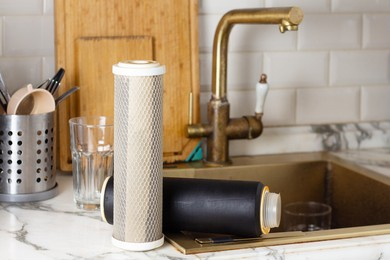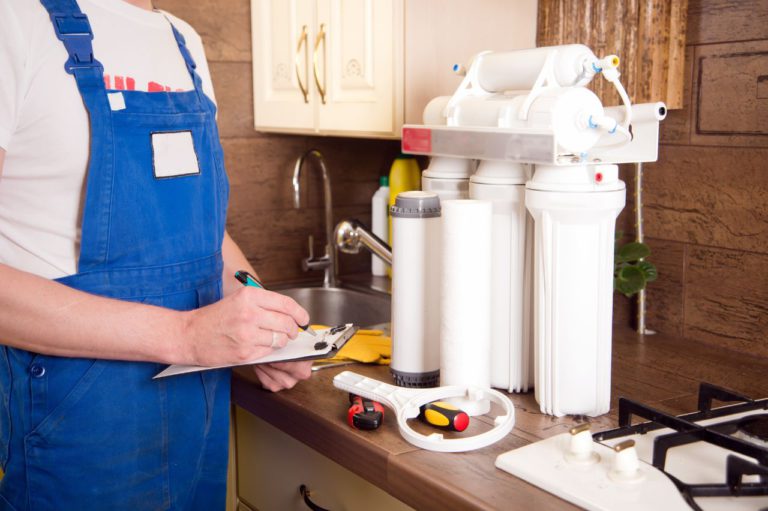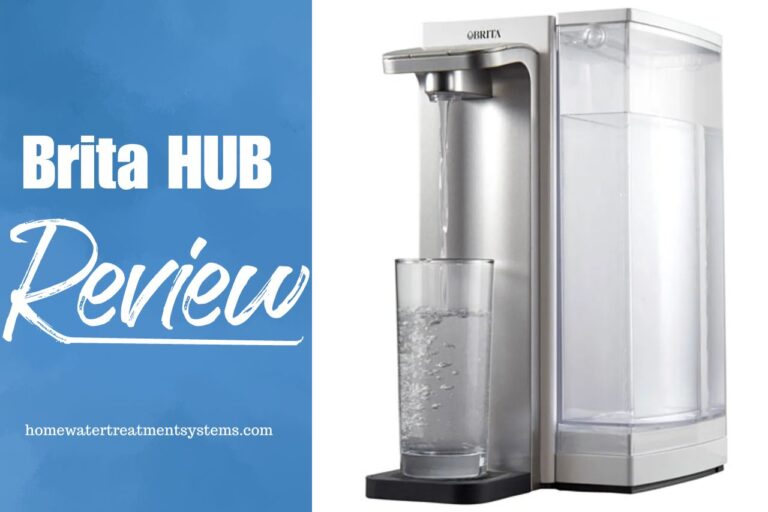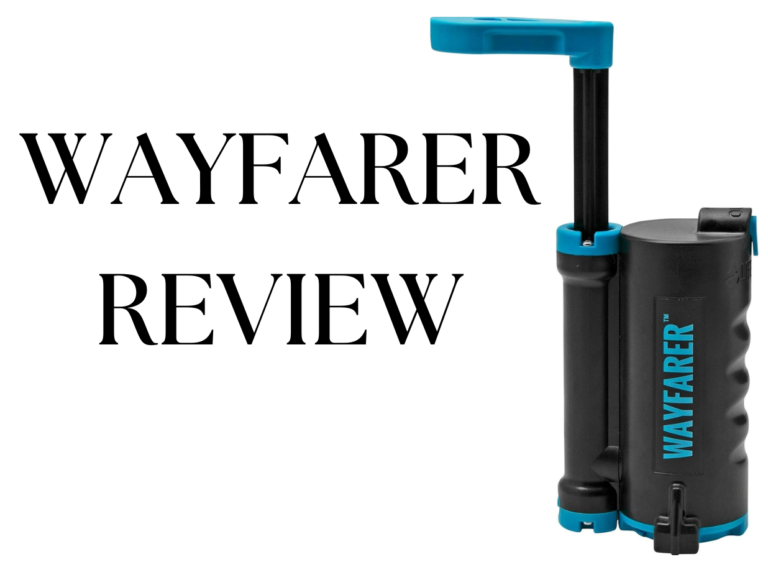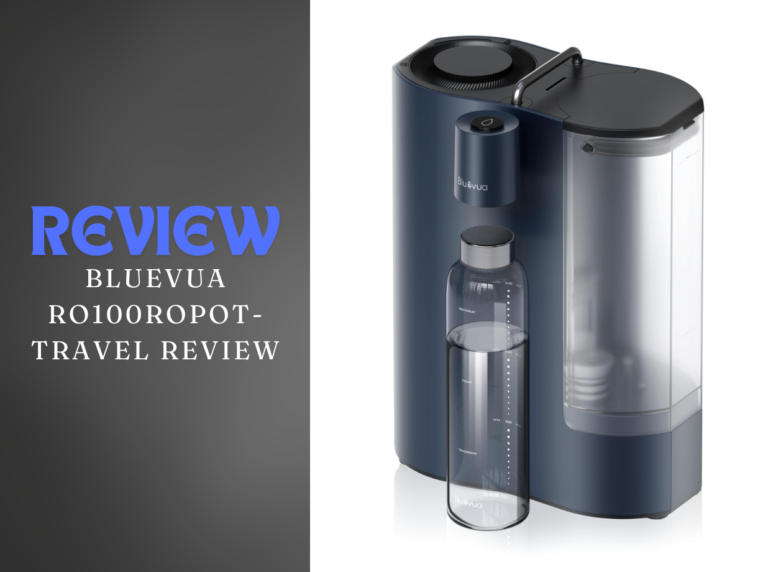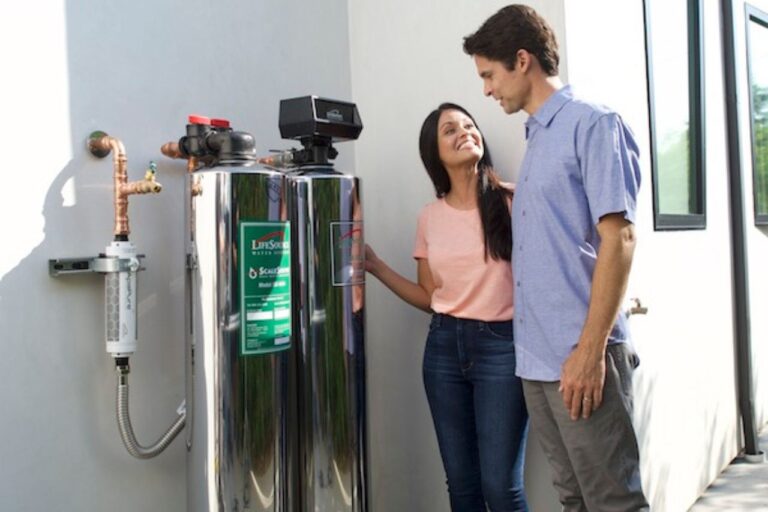Research Water Filtration Systems Before Purchasing
Clean, pure water is not just a luxury; it’s a necessity. Whether you’re making your morning coffee, preparing dinner, or simply staying hydrated, the quality of your water matters.
But with so many water filter options available, how do you determine which one is best for your family?
This guide will navigate you through the complexities, helping you choose the most suitable water filter for your home.
Understanding Your Home’s Water Quality
First and foremost, it’s essential to understand the quality of your home’s water before choosing a filtration system.
Begin by conducting a water test, either through a home-testing kit or by sending a sample to a professional lab.
This will give you a comprehensive analysis of your water’s composition, highlighting issues such as hard water, chlorine levels, bacteria, sediment, and other contaminants.
Once you have your water quality report, identify the primary concerns that need to be addressed.
For example, if your water is high in chlorine, you may need a filter designed to reduce chlorine content.
Alternatively, if sediment and turbidity are the main issues, a sediment filter could be more appropriate.
It’s also important to consider the origin of your water supply. Is it from a municipal supply or a private well?
Municipal water typically has different treatment issues compared to well water, which might have higher levels of natural contaminants like iron or magnesium.
Understanding your water source can help you pinpoint the right type of filtration system needed.
By thoroughly understanding your water quality, you can make an informed decision when selecting the most effective water filtration system for your home.
This ensures that you and your family have access to clean, safe drinking water, protecting your health and extending the lifespan of your household appliances.
“Over 60% of Americans are concerned about the quality of their tap water.”
Why You Need a Water Filter at Home
Every household’s water supply can carry impurities, including harmful bacteria, chemicals, and sediment.
Even if your water appears clear, it doesn’t mean it’s entirely free from contaminants. These pollutants can affect not only your drinking water but also the water you use for cooking, bathing, and cleaning.
A quality water filter helps to eliminate these hazards, offering peace of mind and ensuring your family’s health and well-being.
Contaminants like chlorine and lead can have detrimental effects over time. Chlorine, commonly used in municipal water treatment, can leave an unpleasant taste and smell in your drinking water.
Lead, on the other hand, poses serious health risks, particularly for children. By investing in a water filtration system, you are taking a proactive step towards safeguarding your household from these and other potential dangers.
Not only does filtered water taste and smell better, but it is also safer for your family. From reducing the risk of waterborne diseases to lessening exposure to toxic substances, a water filter provides a tangible improvement in your household’s overall health.
Different Types of Water Filters Explained
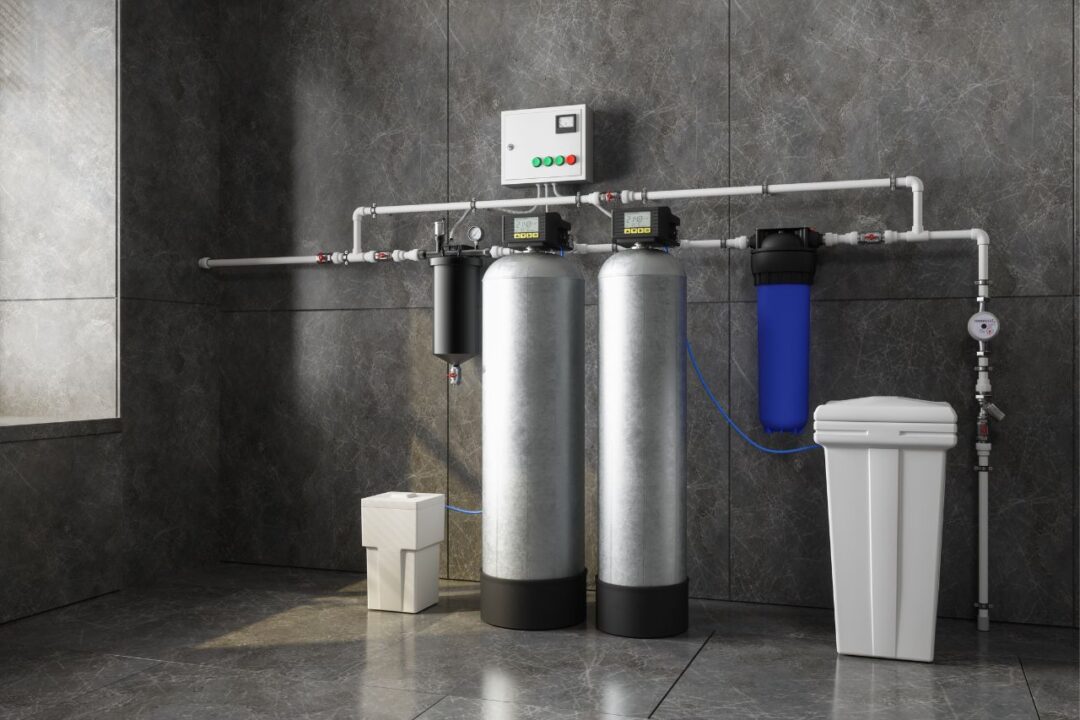
Let’s break down the various types of water filters to help you choose the right one for your home needs:
1. Reverse Osmosis (RO) Filters
Reverse Osmosis filters employ a semi-permeable membrane to remove a wide array of contaminants.
This system is highly effective in eliminating particulates, dissolved solids, and other impurities. One of the major perks is its ability to enhance water taste and remove unwanted odors.
However, RO filters typically produce a lot of wastewater, so consider this if water conservation is a concern.
2. Activated Carbon Filters
Activated carbon filters are popular for their ability to adsorb volatile organic compounds (VOCs), chlorine, and other harmful chemicals.
They are often used in point-of-use systems like countertop, under-sink filters, or in pitcher filters.
Though effective at improving taste and removing many chemicals, they do not remove contaminants like nitrates, salts, or heavy metals.
3. UV Filters
UV (Ultraviolet) filters use ultraviolet light to kill or deactivate pathogens in water. These systems are excellent for eliminating bacteria and viruses without adding chemicals.
They are often used in conjunction with other filtering methods to ensure comprehensive purification.
However, UV filters do not remove chemical contaminants or sediments, making them less versatile on their own.
4. Whole-House Systems
Whole-house water filtration systems treat all the water entering your home, ensuring comprehensive filtration.
These systems can be customized to address specific concerns like heavy metals filtration, iron & manganese removal, and anti-scale properties.
They’re ideal for those who want full-home protection but require a higher upfront investment and regular maintenance.
5. Ceramic Filters
Ceramic filters use a porous ceramic material to filter out bacteria, sediments, and debris. They’re ideal for areas with high sediment or bacterial contamination.
Though effective, they generally require regular cleaning and replacement to maintain efficacy.
How to Identify Your Water Filtration Needs
Determining the right water filter for your home can be broken down into a few straightforward steps. Let’s explore these critical considerations:
Water Problem Assessment
Start by identifying the specific impurities in your water supply. Is it sediment, heavy metals, chlorine, or microorganisms?
You might consider conducting a water test, which can provide a detailed analysis of contaminants.
Knowing what’s in your water is the first step to choosing a filter that will effectively address these issues.
Prioritize Specific Issues
Once you have the test results, prioritize the contaminants you want to eliminate.
For instance, if lead and chlorine are significant concerns, you might lean towards filters with specialized cartridges that target these contaminants.
If biological pathogens are an issue, a UV filter could be the solution. Identifying what needs to be addressed ensures you select the most effective filtration system.
Consider Maintenance and Longevity
Maintenance requirements and the longevity of the filter are also crucial factors. Some filters need frequent replacement of cartridges, while others require professional maintenance.
Think about how much time and effort you’re willing to invest in maintaining your system. Choosing a low-maintenance option might be best if convenience is a top priority.
Flow Rate and Capacity
Flow rate and capacity should align with your household’s water usage. A whole-house system might be necessary for large families or homes with high water demand.
On the other hand, a countertop or under-sink filter could suffice for smaller households.
Check the specifications of each system to ensure it can handle your water needs without compromising on performance.
Certification and Standards
Lastly, it’s essential to select filters that meet recognized standards and certifications.
Organizations like NSF International provide certifications that guarantee a filter’s performance and safety.
Look for products that comply with these standards to ensure you’re getting a reliable and effective filtration system.
Comparing Whole House vs. Point-of-Use Filters
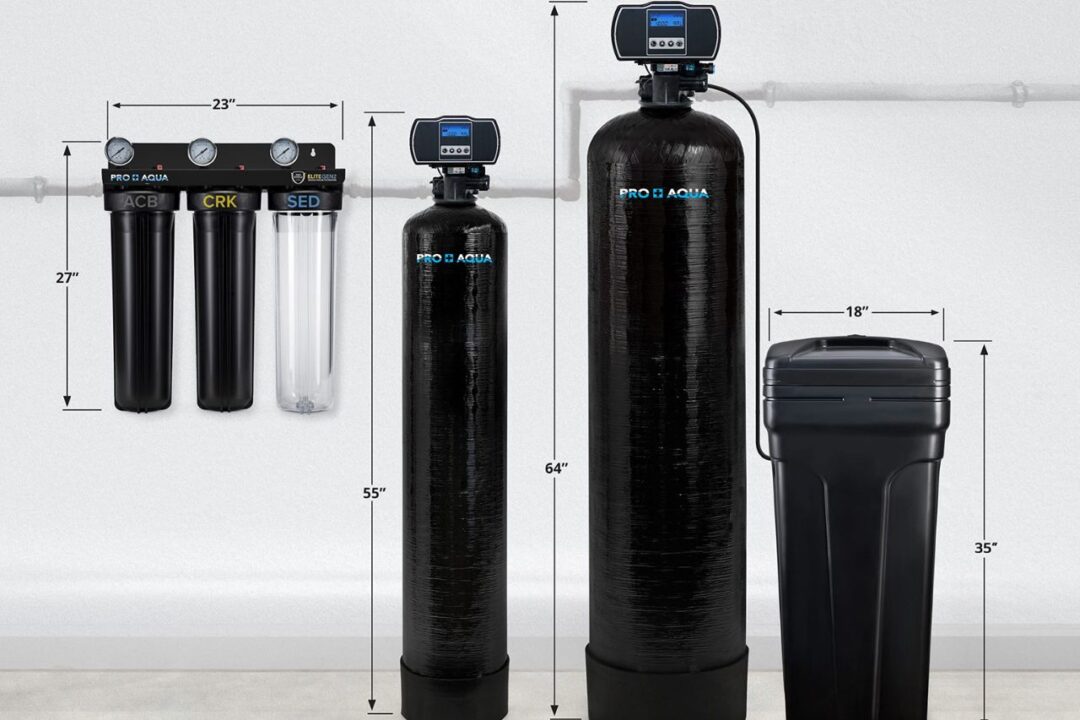
When selecting a water filtration system, you may find yourself torn between whole-house systems and point-of-use filters.
Each option comes with its unique benefits and considerations, tailored to different needs and circumstances.
Whole-House Filters
Whole-house filtration systems, as the name suggests, filter all the water that enters your home.
Whether it’s for drinking, cooking, bathing, or washing clothes, you get consistently clean water throughout the house.
These systems are highly effective at managing large volumes of water and typically require low maintenance.
There are various types of whole-house systems, such as those focused on filtering out heavy metals, iron and manganese, or preventing scale buildup.
They usually come in 1-stage, 2-stage, or even 3-stage configurations, each adding an additional layer of filtration complexity and expertise.
Keep in mind, because they filter all incoming water, installation may require professional help to integrate seamlessly with your existing plumbing.
Point-of-Use Filters
Point-of-use (POU) filters are designed to purify water at specific locations within your home. Common types include under-sink filters, countertop filters, and faucet-mounted filters.
POU systems are generally easier to install and can often be managed without professional assistance.
Under-sink systems are particularly popular for providing purified drinking water directly at the kitchen sink.
For those not ready to commit to a whole-house system, shower filters can offer a targeted solution to improve water quality for bathing, effectively removing chlorine and other contaminants that can affect skin and hair health.
The ease of installation and lower upfront costs make POU filters an attractive choice for many households.
Both whole-house and point-of-use filters are invaluable for improving your home’s water quality. Your choice will depend on your specific needs, budget, and readiness to manage installation and maintenance.
Top-Rated Water Filters for Every Budget

Choosing the right water filter can feel overwhelming with so many options available. To simplify your decision-making, we’ve compiled a list of top-rated water filters catering to various budgets. Here’s what you need to know:
Budget-Friendly Options
If you’re seeking effective filtration without breaking the bank, consider these wallet-friendly choices:
- Brita Pitcher Filters: Perfect for small households, Brita pitchers remove chlorine, lead, and other impurities. They’re affordable and easy to use.
- ZeroWater Pitcher: Offering five-stage filtration, ZeroWater pitchers provide excellent contaminant removal. They come with a TDS meter to ensure water quality.
Mid-Range Choices
For those looking to balance cost and capability, these mid-range filters are a great investment:
- Aquasana Countertop Filter: This countertop unit combines carbon and sub-micron filtration to remove 99% of contaminants, including lead and chlorine. It’s easy to install and maintain.
- APEC ROES-50 Reverse Osmosis System: A five-stage RO system, the APEC ROES-50 offers superior filtration, eliminating up to 99% of bacteria, viruses, and heavy metals. It fits conveniently under your sink.
High-End Solutions
For the ultimate in water purity, consider these top-of-the-line systems:
- Berkey Gravity-Fed Filters: Known for their excellent filtration capabilities, Berkey systems can purify both treated and untreated water from sources like lakes and rivers. They’re perfect for home use and emergency preparedness.
- iSpring WGB32BM 3-Stage Whole House Water Filtration System: This system uses three stages of filtration to remove sediment, chlorine, and iron. It’s ideal for homes with well water.
How to Read and Understand Water Filter Certifications
Understanding water filter certifications can feel daunting, but it’s a crucial step in ensuring you select a filter that meets your needs.
These certifications are designed to provide assurance about the filter’s performance and safety.
What Do These Certifications Mean? Certifications, such as those from NSF International or the Water Quality Association (WQA), confirm that a water filter has been independently tested and meets specific standards for performance and safety.
Look for labels like NSF/ANSI 42, NSF/ANSI 53, and NSF/ANSI 401. Each of these numbers indicates the removal of different contaminants and general water quality improvements.
NSF/ANSI 42 is often associated with aesthetic improvements like taste and odor reduction, primarily dealing with chlorine.
Meanwhile, NSF/ANSI 53 indicates the filter can remove health-related contaminants, such as lead, mercury, and other metals.
If you’re worried about pharmaceuticals and chemicals, NSF/ANSI 401 is the certification to check for.
The Importance of Third-Party Testing Third-party testing and certification verify that the manufacturer’s claims are accurate.
Without these certifications, it’s challenging to trust the efficacy of the filter, no matter how impressive its specifications sound.
Interpreting the Certification Details Not all are filters even with the same created equal, certification.
It’s essential to read the fine print on what specific contaminants are covered.
For instance, just because a filter has NSF/ANSI 53 certification, it doesn’t mean it removes every harmful contaminant.
Check the list of specific contaminants the filter has been tested and certified for.
Trusted Brands and Customer Support When choosing a filter, opt for trusted brands like Filterway.
Trusted brands often provide warranties, quality assurance, and robust customer support, ensuring you have a reliable product that performs as promised.
Understanding water filter certifications empowers you to make informed decisions, ensuring the water you drink is both clean and safe.
Always look beyond the marketing claims and focus on certified performance.
Customer Reviews: What to Look For

Customer reviews can be a treasure trove of information when it comes to selecting the right water filter for your needs.
They offer real-life insights that go beyond product descriptions and specifications. Here’s what to look for:
Overall Satisfaction
Gauge the overall satisfaction of users. If the majority of reviewers are happy with their purchase, it’s a good indicator of a reliable product.
Look for recurring themes in the reviews to understand general user sentiment.
Installation and Setup
Many customers will share their experience with the installation process. Pay close attention to reviews that mention how easy or challenging it was to install the water filter. Some filters may require professional installation, while others can be easily set up by following a user manual.
Performance and Efficiency
This is perhaps the most critical aspect. Reviewers often comment on how well the water filter performs—whether it effectively removes contaminants and improves water taste.
Check for any mentions of changes in water flow rate and capacity, as these can affect daily usage.
Maintenance Insight
One of the most significant aspects to consider is the maintenance of the filter. Reviews often reveal how often filters need to be replaced and whether the process is straightforward or cumbersome. A filter that requires frequent changes can become costly and time-consuming.
Longevity and Durability
Customers frequently update their reviews to mention how the product holds up over time. This can be particularly useful to understand the longevity and durability of the water filter.
Look for mentions of parts wearing out or needing replacement sooner than expected.
Customer Support Experience
When problems arise, effective customer support is essential. Trusted brands like Filterway often receive positive feedback for their warranties and customer service.
Look for reviews that discuss the responsiveness and helpfulness of the support team in resolving issues.
Value for Money
While everyone loves a good deal, ensure that the value aligns with the price.
Reviews that discuss whether the water filter is worth the investment can provide a clear picture of its cost-effectiveness.
Look for mentions of hidden costs or additional accessories required for optimal operation.
User reviews are an invaluable resource that can help you make an informed decision.
By paying attention to these key areas, you’ll be better equipped to choose a water filter that suits your needs and ensures you’re getting the best value for your money.
Choosing the Right Water Filter for Your Family Size

Choosing a water filter isn’t a one-size-fits-all task—especially when considering your family’s size.
The size of your household significantly impacts your water usage and filtration needs, so let’s break it down.
For individuals or couples, a smaller, point-of-use filter like a countertop or under-sink model might suffice.
These systems are designed to provide high-quality filtered water for drinking and cooking without overwhelming your kitchen space or budget.
When you have a small family (3-4 members), you might need a bit more capacity.
Small families often benefit from more robust solutions like a multi-stage under-sink filter, which can handle higher volumes and provide consistent water quality for everyone.
For large families (5+ members), you’ll want a system that can keep up with the high demand while ensuring every drop is contaminant-free.
A whole-house filtration system is often the best way to go, filtering water at the entry point to your home.
This ensures that every faucet and shower in the house dispenses purified water, essential for large households where daily water usage is high.
Consider special filtration needs. If anyone in your family has specific health concerns requiring cleaner water (like compromised immune systems or skin conditions), an advanced filtration system with multiple stages or additional UV sterilization might be necessary, regardless of family size.
It’s also crucial to evaluate flow rate and capacity. Larger families will naturally require systems with higher flow rates to avoid any bottleneck issues, ensuring everyone has access to water when they need it—as well as larger capacity to minimize frequent filter changes.
Remember, the ultimate goal is to match the filter system’s capacity and capabilities with your family’s water consumption patterns. By considering your family size and specific needs, you can ensure that everyone in your household stays hydrated, healthy, and happy.
Conclusion
Choosing the right water filter for your home is not just about convenience; it’s about ensuring the health and safety of your loved ones.
By understanding your home’s water quality and identifying your specific filtration needs, you can make an informed decision that suits your budget and family size.
The perfect water filter doesn’t just address contaminants; it enhances your daily water usage experience, offering peace of mind with every sip.
From budget-friendly options to high-end solutions, there’s a water filter out there that fits your lifestyle and needs.
Don’t forget to take customer reviews seriously—they offer real-world insights on performance and maintenance that can guide your purchase.
Certifications and standards are your benchmarks for quality and reliability, so make sure to read and understand these labels carefully.
Investing in a water filter is an investment in your family’s health. Clean, safe water is a fundamental necessity, and the right filter ensures that you’re providing just that.
Ready to take the next step? Evaluate your options, and choose a system that makes every drop count.
Frequently Asked Questions

Choosing the perfect water filter can be a bit overwhelming with so many options on the market. We understand that you might have some questions.
From installation tips to understanding certifications, our FAQ section aims to address all your concerns.
Below, you’ll find answers to the most common queries our readers have, helping you make an informed decision for your home’s water filtration needs. Let’s dive in!
What is the cost range for home water filters?
The cost of home water filters varies significantly based on several factors, including the type of filter, its capacity, and additional features. Here’s a breakdown to help you get an idea of what to expect:
- Budget-Friendly Options: If you’re looking for an affordable solution, you can find basic faucet-mounted filters or water pitcher filters for as little as $20 to $50. These are great for small households or individuals looking to improve their drinking water without a significant investment.
- Mid-Range Choices: For more comprehensive filtration needs, such as under-sink or countertop filters, prices typically range from $100 to $300. These systems often provide better filtration efficiency, removing a broader spectrum of contaminants and providing a more permanent solution compared to basic models.
- High-End Solutions: Whole-house water filtration systems and advanced reverse osmosis (RO) units fall into this category, with prices ranging from $500 to several thousand dollars. These systems are designed to purify all the water entering your home, offering extensive protection against various contaminants, including heavy metals, chemicals, and bacteria.
The initial purchase price isn’t the only cost to consider. Factor in maintenance expenses, such as filter replacement costs and potential professional installation fees for more complex systems.
Ultimately, choosing the right water filter depends on your specific needs, budget, and desired water quality.
What is the lifespan of various types of water filters?
Understanding the lifespan of a water filter is crucial to ensure your water remains pure and safe.
Each type of filter has a different lifespan, typically influenced by several factors like water quality, usage, and maintenance. Let’s break down the expected lifespans:
- Reverse Osmosis (RO) Filters: RO membranes usually last around 2-3 years, though the pre-filters and post-filters need replacement every 6-12 months. The exact duration can vary based on your water quality and usage patterns.
- Activated Carbon Filters: These filters are quite popular and typically need to be replaced every 3-6 months. High usage or water with high levels of contaminants might reduce their effective life.
- UV Filters: UV lamps in these filters generally need to be replaced once a year or every 9,000 hours of usage. It’s important to monitor the performance regularly to ensure efficiency.
- Whole-House Systems: The components in whole-house filtration systems can have varying lifespans. Sediment pre-filters might need changing every 3-6 months, while carbon filters can last for 12-18 months. Some systems may include additional components with specific replacement schedules.
- Ceramic Filters: These filters are quite durable, usually lasting between 6-12 months, depending on the water quality and the level of ceramic maintenance, such as regular cleaning.
Regular maintenance and timely replacement are key to ensuring your water filter performs optimally.
Always refer to the manufacturer’s guidelines, and keep an eye on any signs of reduced performance, such as changes in water taste or flow rate.
Do water filters remove essential minerals from water?
This depends on the type of water filter you choose. For instance, reverse osmosis (RO) filters are known for their efficiency in removing a wide array of contaminants, including some essential minerals such as calcium and magnesium.
The trade-off, however, is that while these filters excel at offering pure, toxin-free water, they might strip away some beneficial minerals too.
On the other hand, filters like activated carbon do not typically remove these essential minerals.
They are more focused on eliminating chlorine, organic compounds, and other pollutants.
Similarly, ceramic filters and UV systems won’t normally affect mineral content as they target different types of contaminants.
If maintaining essential minerals in your drinking water is a priority, you can seek out RO systems that feature a remineralization stage.
This stage adds back important minerals which were removed during the filtration process, offering the best of both worlds: purified and mineral-rich water.
Always check the specifications of the filter and consult with the manufacturer to understand the mineral retention capabilities of the chosen system.
This ensures that you not only get clean water but also a healthful balance of necessary minerals.

